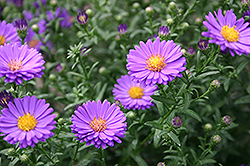Height: 3 feet
Spread: 18 inches
Sunlight:
![]()
![]()
Hardiness Zone: 3
Other Names: New York Aster, Michaelmas Daisy
Description:
Profusion of dark lavender-blue flowers and attractive lance-like green leaves; prefers cool, moist soil; water the root zone instead of from the top to reduce fungal disease; water regularly to encourgage more blooms
Ornamental Features
Days Aster has masses of beautiful lavender daisy flowers with yellow eyes at the ends of the stems from late summer to late fall, which are most effective when planted in groupings. The flowers are excellent for cutting. Its narrow leaves remain forest green in color throughout the season.
Landscape Attributes
Days Aster is a dense herbaceous perennial with an upright spreading habit of growth. Its relatively fine texture sets it apart from other garden plants with less refined foliage.
This is a relatively low maintenance plant, and is best cleaned up in early spring before it resumes active growth for the season. It is a good choice for attracting butterflies to your yard, but is not particularly attractive to deer who tend to leave it alone in favor of tastier treats. Gardeners should be aware of the following characteristic(s) that may warrant special consideration;
- Disease
Days Aster is recommended for the following landscape applications;
- Mass Planting
- General Garden Use
Planting & Growing
Days Aster will grow to be about 3 feet tall at maturity, with a spread of 18 inches. It tends to be leggy, with a typical clearance of 1 foot from the ground, and should be underplanted with lower-growing perennials. The flower stalks can be weak and so it may require staking in exposed sites or excessively rich soils. It grows at a medium rate, and under ideal conditions can be expected to live for approximately 8 years. As an herbaceous perennial, this plant will usually die back to the crown each winter, and will regrow from the base each spring. Be careful not to disturb the crown in late winter when it may not be readily seen!
This plant does best in full sun to partial shade. It prefers to grow in average to moist conditions, and shouldn't be allowed to dry out. It is not particular as to soil type or pH. It is somewhat tolerant of urban pollution. This particular variety is an interspecific hybrid. It can be propagated by division; however, as a cultivated variety, be aware that it may be subject to certain restrictions or prohibitions on propagation.
